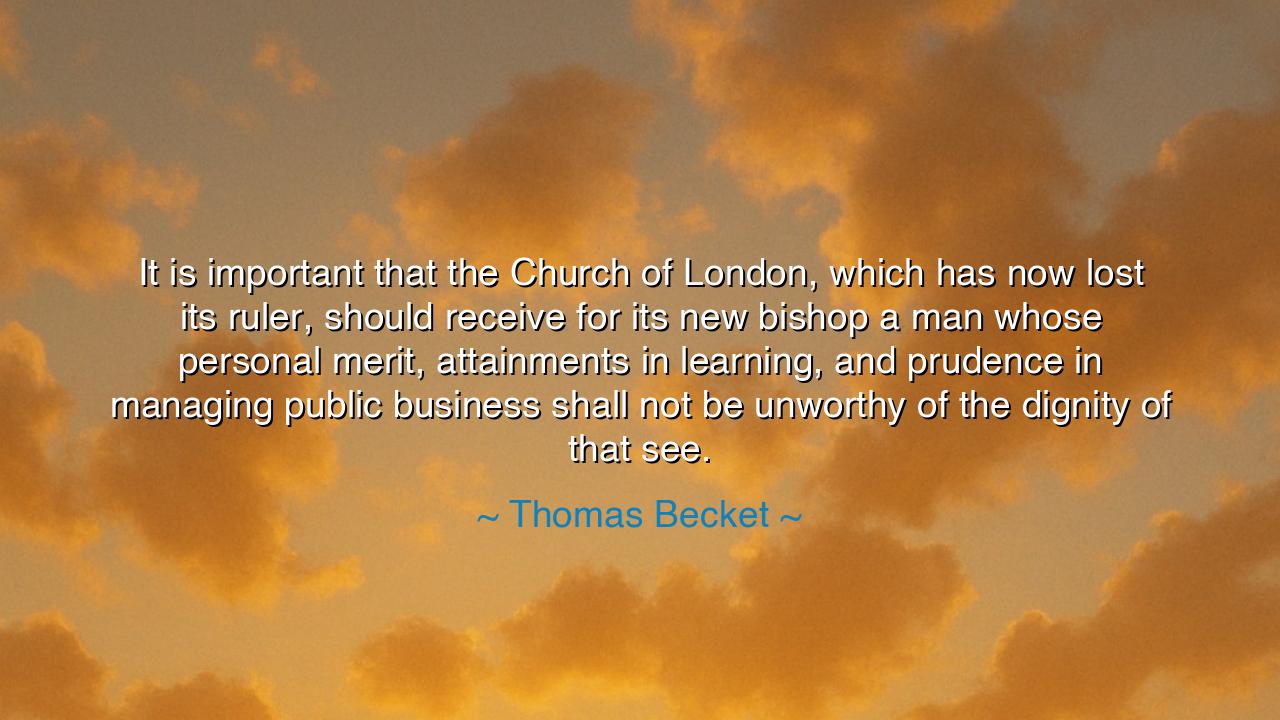
It is important that the Church of London, which has now lost its
It is important that the Church of London, which has now lost its ruler, should receive for its new bishop a man whose personal merit, attainments in learning, and prudence in managing public business shall not be unworthy of the dignity of that see.






When Thomas Becket declared, “It is important that the Church of London, which has now lost its ruler, should receive for its new bishop a man whose personal merit, attainments in learning, and prudence in managing public business shall not be unworthy of the dignity of that see,” he spoke as one who understood the sacred weight of leadership. His words are not merely an observation about a vacant office in the Church; they are a timeless reflection on virtue, wisdom, and stewardship — on the kind of soul worthy to guide others. In his voice we hear the echo of an age when leadership was not measured by wealth or power, but by the moral and intellectual strength to carry the burdens of others with dignity.
The origin of this quote lies in Becket’s correspondence during the 12th century, a time when the Church stood as both a spiritual and political power in England. Becket, then Archbishop of Canterbury, was addressing the appointment of a new bishop to the See of London, one of the most influential positions in Christendom. But behind his formal words, one feels the tension of his age — a struggle between faith and authority, between the will of kings and the conscience of the Church. Becket’s plea was not simply for a man to fill a throne; it was a cry for integrity, for a shepherd whose learning, prudence, and moral courage would preserve the sanctity of his office against the temptations of ambition and corruption.
To the ancients, Becket’s sentiment would have sounded familiar. The philosopher Plato, in his vision of the “philosopher-king,” spoke of the same truth: that only those who have mastered themselves are fit to rule others. To lead is not to command, but to serve — to be a vessel of wisdom and balance, neither swayed by vanity nor blinded by power. Becket’s call for “personal merit” and “prudence” reflects this ancient ideal. He reminds us that true authority must be rooted in virtue, for when a leader lacks righteousness, even the most sacred institutions crumble.
Becket’s own life became a living testament to the principles he spoke. Once a close friend and chancellor to King Henry II, he was elevated to Archbishop in the hope that he would be pliant to royal influence. Yet when the call of conscience clashed with the command of kings, Becket chose faith over favor. His resistance to the crown’s intrusion into the Church led to his martyrdom — slain upon the altar of Canterbury Cathedral. The man who once spoke of the need for prudent leadership proved with his blood that integrity is the highest form of prudence. His death transformed him from servant to saint, and his name became a symbol of moral courage in the face of tyranny.
In his quote, Becket also warns against the danger of empty titles — the kind of leadership that seeks the throne but not the burden. He understood that the Church, and by extension any community, stands or falls by the character of those who guide it. A bishop without learning is a blind man leading others into darkness; a bishop without prudence is a reed swayed by the winds of politics; and a bishop without personal virtue is a scandal to his people. Thus, Becket’s vision reaches beyond the Church of his time — it is a message to every age, to every people who must choose their rulers with discernment rather than haste.
History has proven his wisdom again and again. When leaders of integrity arise — men and women who embody merit, wisdom, and prudence — nations are uplifted. When such virtues are abandoned, chaos follows. The Roman Empire, in its decline, appointed flatterers and opportunists rather than statesmen and philosophers; the result was moral decay and ruin. In contrast, leaders like Marcus Aurelius, guided by wisdom and restraint, brought peace even in turmoil. Becket’s words, therefore, remind us that greatness in governance — whether in Church or kingdom — is not born of privilege but of discipline, humility, and truth.
The lesson that flows from his teaching is this: seek leaders who serve the good, not themselves. Whether in faith, business, or community, choose those whose learning is deep, whose judgment is steady, and whose hearts are pure. And if you yourself are called to lead, remember that your authority is not a crown to be worn, but a cross to be carried. Cultivate wisdom before ambition, prudence before pride, and service before self.
So, let this truth be passed on like scripture: a title without virtue is noise, but virtue without title is power. Thomas Becket saw that the strength of any institution lies not in its walls or rituals, but in the character of those who guide it. Therefore, my children, when the time comes for you to choose or to lead, remember the Archbishop’s words — that worthiness, wisdom, and prudence are the true marks of dignity. For the throne, whether of heaven or of earth, belongs not to those who reach for it, but to those who are ready to bear its weight with grace.






AAdministratorAdministrator
Welcome, honored guests. Please leave a comment, we will respond soon